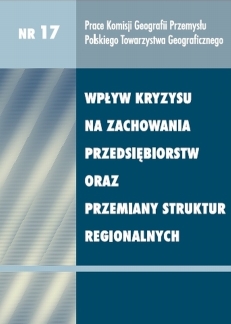Funkcjonowanie korporacji Ericsson w warunkach globalnego kryzysu gospodarczego
DOI:
https://doi.org/10.24917/20801653.17.17Słowa kluczowe:
korporacje, Ericsson, kryzysAbstrakt
Ericsson is the company which has been operating on the market for more than thirty years. It continuously develops with the use of knowledge and innovations. The company was founded first as a workshop of telegraphic devices, and later became the leading provider of services for telecommunication companies. Ericsson is the leader in the field of mobile technologies 2G, 3G and 4G, and it operates the networks used by more than billion subscribers.The aim of the following thesis is to analyse the activity of Ericsson. Its aim is also to introduce the process of development and organization of Ericsson company internationally in the conditions of global economic crisis. The expression of the development of this corporation is the increase in its economic potential between 1970 and 2009 and the increase of 29,04 billion USD in sales (from 656,86 billion USD), the worth of the assets from 0,5 billion USD to 37,95 billion USD, the worth of the profits from 42,09 billion USD to 580,45 billion USD, the worth of its own capital from 332,6 billion USD to 19,67 billion USD, and the increase in employment from 61,900 to 82,590 people. Nowadays Ericsson company is operating in 185 countries and more than 95% of its sale takes place outside Sweden. At present Ericsson strengthens its position at eastern markets, mainly in China and India, which is proved by the big amount of regional representatives in both countries. Chinese companies became the biggest customer of Ericsson company, generating 7% of the company’s income. Next in line is India, which is as important as the USA, as far as the income is concerned. In both countries Ericsson gains 6% of its income. The process of technological development in the fields of telecommunication and communication, as well as gaining bigger Chinese and Indian markets, allows to prevent the negative effects of global economic crisis and creates the chances for the further development of Ericsson company.Downloads
Metrics
Bibliografia
Bonar P., 2010, Kształtowanie się ponadnarodowej korporacji Ericsson (praca magisterska). Zakład Przedsiębiorczości i Gospodarki Przestrzennej, Instytut Geografii UP, Kraków.
Majewski J., 2005, Ericsson 100 lat w Polsce, Ericsson, Warszawa.
Międzynarodowe Standardy Sprawozdawczości Finansowej (MSSF), 2004, International Accounting Standard Bard, London, Stowarzyszenie Księgowych w Polsce, Warszawa.
Munn G.G., Garcia F.L., Woelfel Ch.J., 1991, Encyclopedia of Banking & Finance, McGraw-Hill Book Company, London.
Nowak E., 2008, Analiza sprawozdań finansowych, PWE, Warszawa.
Zioło Z., 2006, Zróżnicowanie światowej przestrzeni przemysłowej w świetle siedzib zarządów wiodących korporacji, [w:] Międzynarodowe uwarunkowania rozwoju polskiego przemysłu, red. Z. Zioło, T. Rachwał, Prace Komisji Geografii Przemysłu PTG, nr 8, Komisja Geografii Przemysłu PTG w Warszawie, IG AP w Krakowie, Warszawa−Kraków, s. 9–26.
Zioło Z.,2009, Struktura przestrzenna przemysłu informatycznego w Polsce w 2007 roku, [w:] Problematyka XXV. Międzynarodowej Konferencji Naukowej nt. „Procesy transformacji przemysłu i usług w regionalnych i krajowych układach przestrzennych”, red. Z. Zioło i T. Rachwał, Warszawa–Kraków, s. 103–107.
Zioło Z., 2009, Procesy kształtowania się światowych korporacji i ich wpływ na otoczenie, [w:] Wpływ procesów globalizacji i integracji europejskiej na transformacje struktur przemysłowych, red. Z. Zioło i T. Rachwał, Prace Komisji Geografii Przemysłu PTG, nr 12, Komisja Geografii Przemysłu PTG w Warszawie i IG AP w Krakowie, Warszawa–Kraków, s. 11−32. http://www.ericsson.com/pl/ http://www.ericsson.com http://www.ericssonhistory.com
Pobrania
Opublikowane
Jak cytować
Numer
Dział
Licencja
Artykuły publikowane są zgodnie z warunkami licencji Creative Commons (CC BY-ND 4.0; uznanie autorstwa-bez utworów zależnych).

